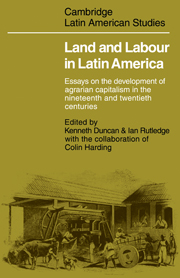 Land and Labourin Latin America
Land and Labourin Latin America Book contents
- Frontmatter
- Contents
- List of tables
- List of figures
- List of maps
- Acknowledgements
- 1 Introduction: patterns of agrarian capitalism in Latin America
- PART I THE TRANSITION FROM TRADITIONAL HACIENDA TO CAPITALIST ESTATE
- PART II THE DEVELOPMENT OF A PLANTATION ECONOMY WITH LABOUR RECRUITMENT FROM HIGHLAND PEASANT COMMUNITIES
- PART III THE DEVELOPMENT OF COMMERCIAL AGRICULTURE USING EUROPEAN IMMIGRANT LABOUR
- PART IV THE TRANSITION FROM SLAVE PLANTATION TO CAPITALIST PLANTATION
- PART V POSTSCRIPT
- 18 Latin American ‘landlords’ and ‘peasants’ and the outer world during the national period
- 19 Abstracts of other papers
- Glossary of Spanish and Portuguese terms used in the text
- Weights and measures
- Notes on contributors
- Indexes Subjects
- Authors
19 - Abstracts of other papers
Published online by Cambridge University Press: 07 May 2010
- Frontmatter
- Contents
- List of tables
- List of figures
- List of maps
- Acknowledgements
- 1 Introduction: patterns of agrarian capitalism in Latin America
- PART I THE TRANSITION FROM TRADITIONAL HACIENDA TO CAPITALIST ESTATE
- PART II THE DEVELOPMENT OF A PLANTATION ECONOMY WITH LABOUR RECRUITMENT FROM HIGHLAND PEASANT COMMUNITIES
- PART III THE DEVELOPMENT OF COMMERCIAL AGRICULTURE USING EUROPEAN IMMIGRANT LABOUR
- PART IV THE TRANSITION FROM SLAVE PLANTATION TO CAPITALIST PLANTATION
- PART V POSTSCRIPT
- 18 Latin American ‘landlords’ and ‘peasants’ and the outer world during the national period
- 19 Abstracts of other papers
- Glossary of Spanish and Portuguese terms used in the text
- Weights and measures
- Notes on contributors
- Indexes Subjects
- Authors
Summary
Plantations, peasants, and proletariat in the West Indies: an essay on agrarian capitalism and alienation
GEORGE BECKFORD
This paper explores the origins of rural poverty in the West Indies. Beckford's discussion of the transition from slavery to free labour illustrates many of the points brought out in Part IV of this book. In particular the author distinguishes between, on the one hand, the Leeward Islands – where the shortage of cultivable land threw the ex-slaves back onto the plantation system for subsistence – and, on the other hand, the larger territories, such as Jamaica, Trinidad, and Guyana, where the greater availability of land outside the plantation system provided the basis for the emergence of a peasant-farmer group from among the ranks of the ex-slaves.
The emancipation of the slaves in 1838 generally forced up the cost of labour in the West Indies, and together with certain other economic difficulties this change in the relations of production gave a strong impetus to the search for more efficient forms of production and an improved technology in the sugar industry. This development of a modern sugar industry in the latter part of the nineteenth century can be compared with the changes which were taking place simultaneously in other sugar-producing areas such as northeast Brazil and coastal Peru.
However, the condition of the rural sugar proletariat and the small farmer class remained extremely depressed, and major agrarian unrest occurred in 1865 (Jamaica), 1935 (St Kitts), and 1938 (Jamaica). Beckford argues that the peasant-farmer group played a key role in these rural revolts.
- Type
- Chapter
- Information
- Land and Labourin Latin AmericaEssays on the Development of Agrarian Capitalism in the nineteenth and twentieth centuries, pp. 483 - 489Publisher: Cambridge University PressPrint publication year: 1978


